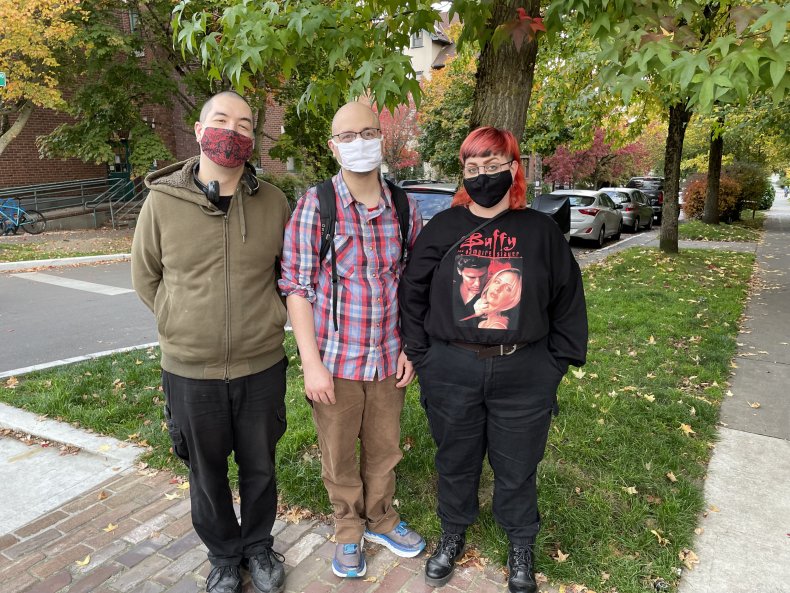Can you defame a religion, especially one that doesn’t believe in God, Satan or the supernatural?
The answer to that question could cost four former members of The Satanic Temple (TST) more than $140,000 in damages, including “reputation losses,” in a civil lawsuit that has dragged on for more than a year and a half.
Satanic Temple leaders readily admit people are free to criticize them, but not to use the organization’s own Facebook pages to do it. They claim the quartet commandeered TST’s Washington state chapter Facebook pages to claim that TST mismanages funds, harasses dissenters, tolerates anti-Semitism and abusive leadership, and is a cult-like group masquerading as a religion.
The four members say they posted only links to news articles and other material already in the public sphere. They say one can’t be held liable for defaming an organization that qualifies as a church under Internal Revenue Service rules and claims 500,000 members.
“You can’t slander a religion,” said David Alan Johnson, the former social media editor for the chapter. “And they’ve never been able to point to anything we’ve said that wasn’t true.”
So far, a federal judge in Seattle has agreed with them.
The now-former members post under the name of QueerSatanic (as a way to describe their various sexual identities and orientations) on a Twitter page with a grunge/anarchist vibe. They’ve spent $80,000 defending themselves in court this past year, but a GoFundMe campaign has raised $18,800 to date. “A year and a half later, our livelihoods are being torn apart by this suit,” wrote Leah Fishbaugh, 30, one of the defendants, on GoFundMe. “Just as the plaintiffs wanted, we are at a breaking point.”
Along with Fishbaugh, other defendants included Johnson, 34; Mickey Meeham (aka Joshua Calavera), 39; and Nathan Sullivan, 33. At one point, they were volunteers maintaining the group’s website, membership and social media. Calavera has since declared bankruptcy, and the others say the lawsuit is eating them alive financially.
“This is the single most traumatic financial thing that has happened to me,” said Johnson, a former newspaper reporter now working for a Seattle-area research nonprofit. While digging up facts for their defense, they’ve run into other aggrieved Satanists around the country who have a litany of complaints about the organization, including allegations of sexually deviant gatherings that, according to one TST memo, allow for “orgies, BDSM, fetish balls… ritual flogging, live ritual sex, burlesque show.”
As the first ex-members to be sued by TST, they feel responsible for disclosing that TST, which posits itself as a counterweight to the Religious Right, has plenty of its own skeletons. “This is an important thing that needs to be told,” said Fishbaugh.

JOSEPH PREZIOSO/AFP via Getty Images
‘Speak of the Devil’
Based in Salem, Mass., the site of the famous witch trials of the late 17th century, TST was founded in early 2013. This was around the time TST staged a prank mockumentary in Florida with actors impersonating Satanists. It then morphed into a religious movement that relished wild PR moves like the 2014 staging of a Black Mass on the campus of Harvard University. (The event was later moved off campus).
The idea of a faith group based on sticking it to authority figures caught on and it grew quickly. But its main focus was also its biggest vulnerability, explained Joseph Laycock, a religious studies professor at Texas State University in San Marcos and the author of the 2020 book “Speak of the Devil: How The Satanic Temple is Changing the Way We Talk about Religion.”
“This is a group of people whose sacred story is one of rebellion against authority,” he told Newsweek. “It is inherently paradoxical: how do you have an organized religion with people who see rebellion as sacred?”
Indeed, the organization’s web site highlights Satan as “the eternal rebel in opposition to arbitrary authority,” best exemplified by the fallen angel portrayed in 17th-century poet John Milton’s epic “Paradise Lost.” However, TST is non-theistic; it does not actually believe in the existence of God, much less a fallen angel called Satan.
TST jealously guards its reputation as a kick-ass religious-rights organization, bolstering its cred with high-profile lawsuits such as Satanic Temple et al v. Scottsdale, AZ, against a municipality that refused to allow a Satanic prayer before city council meetings. Or Cave et al. v Thurston, centered on the Arkansas state capitol grounds where officials would not allow a satanic-themed statue known as Baphomet (a horned half-man, half-goat deity seated on a throne under an inverted pentagram) to be erected.
In 2018, TST sued Twitter for temporarily suspending the account of co-founder Lucien Greaves (also known as Douglas Misicko or Doug Mesner) and later that year sued Netflix for $50 million for using a likeness of Baphomet in a TV program
The Satanists have been in the news most recently for challenging Texas’ Senate Bill 8, aka the “heartbeat law” that forbids abortions after a fetal heartbeat can be detected six weeks into a pregnancy. The group claims that abortion is a religious act for its members and the law’s imposition tramples on peoples’ religious right to terminate a pregnancy. (It’s not clear whether TST actually practices abortion as a religious ritual; the claim may be a legal tactic or political theatre.)
The lawsuit against the Seattle members (The United Federation of Churches, LLC v. Johnson et al.) has been comparatively under wraps. Filed April 3, 2020, in the U.S. District Court for Western Washington, the plaintiff used its business name to represent TST.
“No one liked to have Satanists around, so we hoped to have a more neutral entity name to work across denominations,” Greaves told Newsweek, explaining why they call themselves the United Federation. “We wanted a central brand name to fall back on to be more inclusive and not as abrasive as the Satanic Temple.”
The targets of the suit were four volunteers in the Seattle chapter. In charge of membership was Sullivan, who grew up in the Midwest in a homeschooling Christian household. In 2014, he got wind of TST’s efforts to distribute a Satanic coloring book as a way of counteracting religious literature given out in public schools. Having felt indoctrinated with Christianity as a child, he was intrigued and eventually joined the Seattle chapter.
Leah Fishbaugh, who uses they/them pronouns, was raised in Reconstructionist Judaism. A founding member of a Seattle burlesque co-op, they joined in June 2019, about the same time Johnson did.
“David [Johnson] and I went to see the documentary ‘Hail Satan,'” they said, referring to the 2019 film directed by Penny Lane that chronicles the rise of TST. “We were very swayed by that. We thought it was very cool an organization was doing activist-type things that aligned with our values.
“I actually don’t identify with Satanism at all; I never did,” they said. “I just thought activism was neat, but I am still very much a Jew. They were doing things and I wanted to do things. I found all the Satanism stuff to be quite cringy, to be honest.”
Johnson, a former Southern Baptist, says no one in the chapter actually prayed to Satan. “There are rituals that some people do but those aren’t rituals invoking a higher power,” he said. “It’s more like externalizing your interior notions.
“I find religion to be fascinating and I still read the Bible for fun,” he said. “I just don’t believe there’s anything divinely inspired or supernatural in it.”
The trio, along with Calavera, helped maintain the group’s website, membership and social media. The Washington state chapter included 20 core members at the most, the defendants said; attendance at monthly events never surpassed 30 people.
“When we started, there weren’t any red flags,” said Johnson. All four were aware that Greaves had some major baggage in his past; specifically an embarrassing podcast in 2002 where he made anti-Semitic remarks. (Example : “Like, I think it’s okay to hate Jews if you hate them because they’re Jewish and they wear a stupid fuckin’ Frisbee on their head…”) Greaves later apologized for his comments.
What also nettled the Seattleites—and many TST members nationwide—was Greaves’ decision in 2014 to use attorney Mark Randazza to represent TST in the Twitter lawsuit. Randazza is known for defending neo-Nazis as well as right-wing conspiracy theorist Alex Jones. In addition to his work on behalf of unpopular clients, Randazza had had his license suspended by the Nevada bar in 2018 for ethics violations (although the suspension never went into effect).
But money was an issue. “There were people upset that we accepted the pro bono work of Mark Randazza; in that the optics were wrong and that we were sympathetic to the alt right to use him,” Greaves told Newsweek. “But we couldn’t turn down pro-bono help.”
Greaves said three chapters, including one in Los Angeles, left TST over the matter in 2018. (The Los Angeles chapter labeled Randazza a “Twitter troll and an agent of the alt-right.”). The other two chapters were based in the U.K. and Portland, Ore.
“We were pretty critical of Lucien Greaves because we found out he said the anti-Semitic stuff,” said Johnson. “We thought it was OK to criticize him. Over time it changed.”
Bit by bit, items critical of TST showed up on its Seattle chapter’s Facebook page. Then in March 2020, according to the lawsuit, the defendants went rogue, causing computer hacking as well as “defamation,” “unfair competition,” “cyberpiracy” and “tortious interference with business expectancy.”
The suit, filed April 3, 2020, claimed the defendants hijacked TST’s two Facebook pages, posting critical comments, damaging the organization’s reputation and causing members to flee. The main Washington state chapter page, the suit said, had been active since 2014 and had some 17,000 followers. A more recent page, “Evergreen Memes for Queer Satanic Fiends,” had 500 followers.
The lawsuit contends that the four ex-members were removed from their positions on March 12, 2020, after a conflict with the chapter heads, but managed to later hack into the Facebook pages and post damaging material under the TST name.
TST sued for $143,000 in damages, plus court costs.
The defendants denied all charges, saying the real issue concerned an intra-chapter feud where the four of them were copied on an email about an ethics complaint involving sexual harassment. “This person filed a complaint to the chapter’s leadership and included some of us as witnesses,” said Sullivan. “And the act of our being witnesses to the complaint was interpreted by leadership as proof of a splinter group.”
By the end of the month, process servers were knocking on the defendants’ doors. “We were served papers as the world was falling apart around us,” said Sullivan. “It was like, ‘Are you seriously going to sue us claiming $150,000 in damages?’ “

Julia Duin/Newsweek
Word of the conflict spread quickly. Fishbaugh said “many” people left the Seattle chapter when the defendants were ejected: “They said ‘Hey, this is clearly fucked up; this is clearly a hierarchical system I don’t want to be part of. This is not Satanism. We’re also leaving.’ For a brief moment, we were united like people who leave cults are united.”
Matthew Kezhaya, TST’s general counsel, demanded the main page be returned. Within two months, TST regained the main page, but not the Evergreen Memes page. Meanwhile some members wondered why an organization like TST would go after four Seattleites with very modest means while it had bigger fish to fry elsewhere.
But Kezhaya saw this as an issue that needed to be quickly nipped in the bud.
“You can’t steal someone’s stuff,” he told Newsweek. “You can’t hack Facebook pages and use those pages to cause harm to the owner.”
The defendants asked in June 2020 that the case be dismissed.
“Part of our motion to dismiss is saying you have not sufficiently connected most of the defendants here to the stuff you’re complaining about,” said Sullivan. “You have no allegations of fraudulent activity by myself, by Leah or even by Joshua.”
In a withering 14-page judgment, U.S. District Judge Richard A. Jones dismissed the lawsuit on Feb. 26, 2021, saying the plaintiffs got their facts wrong on the actual domain name of the Facebook page and that other claims made by TST were “implausible.” Moreover, the judge added, for the court to rule that TST was defamed, it would have to define TST’s religious beliefs, which is not allowed under the First Amendment.
He was referring to a constitutional law doctrine known as ecclesiastical abstention, in which a court is not qualified—and therefore prohibited from ruling on—doctrinal disputes. Otherwise, the court would have to investigate each of the church’s doctrines under question and interpret them to settle a defamation case.
“It was tossed out because they [TST[ claim to be a religion and you are allowed to criticize religions,” Johnson said. “They like to say they are a business when it comes to competitor organizations forming or when someone is using their intellectual property. Otherwise, they claim to be a religion.”
But Kezhaya argues that the defendants can be held liable for making false statements whether or not the subject involves religion. “They said TST are literal Nazis. That is objectively false,” he said, arguing that the judge erred in throwing out the defamation claim. He asked the court last Spring to reconsider the motion.
Of all the defendants, Johnson is the one who has spent the most time digging into TST’s background. “Every time I think I’ve hit the bottom, there’s another terrible thing comes out,” he said. “People send us things we can’t talk about because we can’t substantiate them.”
Some have gone on record, such as Jinx Strange, the Wisconsin-based arch-lector of the Luciferian Dominion, an academic order, who got interested in the growing TST movement as a venue for progressive Satanism.
“I joined their community group which, at that point even then, was a kind of directionless mosh pit where Satanists mostly yelled things over each other about what they thought Satanism was, without a lot of input or direction from leadership,” he told Newsweek in an email. “The only times leaders seemed to weigh in was to the very large libertarian bloc of members in quashing discussions about trans rights and Satanism, which seemed to be the biggest flashpoint.”
He hadn’t been involved long when he came to feel that TST “appeared to be an inept, rudderless organization that had accidentally risen to prominence through something of a disingenuous prank,” referring to the 2013 filming event in Florida. He soon left the group, then was leaked material about “leaders posing happily with major alt-right media figures,” he wrote. “Accounts of sexual abuse being covered up in ways that were more than anecdotal. Dozens of people kicked out for asking for financial records from this alleged-non-profit organization.”
“Safe, sane and consensual”
TST has driven off its best people and lowered itself to has-been status since then, Strange concluded. “Actual activists, and even creatives, want nothing to do with them anymore.”
Greaves said such complaints are old news.
“We get this litany of senseless disparaging claims against us that says we’re a religious group acting in a nefarious manner,” he said. “They call us a cult, which doesn’t stand up to scrutiny either. …I don’t think there is anything incredibly cult-like in what we do.”
“Scott Malphas,” (an assumed name) and a past member of an Arizona chapter, points to a Jan. 7, 2020, posting on the organization’s Facebook page offering suggestions for the TST holiday of Lupercalia on Feb. 15. Among the suggestions for its observance was “Rituals with a mock sacrifice, orgies, BDSM, asexual awareness, bodily autonomy, wolves.”
Malphas said he filed a complaint about TST’s decision to approve what he termed “official orgies” along with explicit “sex positive guidelines” the organization gave out for its gatherings. In response, he said he was accused of bigotry. “This is a religion,” he wrote on the complaint, “but it is feeling more like an SJW poly social club.”
Greaves said no sexual activities were compulsory.
“The guidelines are merely meant to set parameters in which if these things are incorporated into any TST events, they are done in a way that is safe, sane, and consensual, and that nobody feels uncomfortable or coerced,” he emailed Newsweek.
Salome DeMeur, a pseudonym for a former member based in Pensacola, Fla., said she got sidelined after asking Greaves why “he was going to sue Twitter like it was personal vendetta, but then using TST money to do so.” Once she became known as a dissenter, she said, members of TST’s national council threatened to out her to the Marine Corps, her employer, despite the Corps already being aware of DeMeur’s religious activities.
“After leaving, it was basically Scientology-lite,” she told Newsweek in an email. “People were told not to talk to us. Members were trying to break up my relationship with my boyfriend. Several people were legally threatened. I know quite a few people who have refused to speak out at all because they fear legal action from TST. A few of us have been in mental health treatment since.”
Shock value
The Satanic Temple recently made some significant structural changes, apparently in an effort to appear more like a mainstream church. Its groups are now called “congregations” instead of chapters, and the leaders are “ministers.” There are currently about 50 ministers, according to Greaves. To qualify as clergy, applicants must complete 10 hours of online coursework, pay a $149 ordination registration fee and an annual license fee of $59.
That switch won’t make the group respectable in the eyes of the world, said Laycock, adding that TST’s brand relies on increasing the shock value.
“The Satanic Temple is in a double bind,” he said. “On one hand, if they don’t do something shocking or disturbing like blaspheming or black Masses, people say they aren’t real Satanists. But if they do the black Masses, people say you have no place in polite society.”
TST’s brand is still under debate in Seattle. In June, the defendants requested the case be dismissed. Kezhaya, the TST lawyer, has asked the court to reconsider. He hopes to have an affirmative answer from the judge by early next year.
“If they don’t give us the stuff back and settle in terms we find acceptable, then there is no other option than a jury trial,” he said. “If they did this on their own web page, we wouldn’t be in a lawsuit right now. But they put it on our page.”
The defendants say the case has devolved to a meritless S.L.A.P.P. (Strategic Lawsuit Against Public Participation) lawsuit as a way to bankrupt them for speaking out. Asked if there is an ideal form of Satanism out there, they laugh.
“That is a whole dissertation,” Sullivan replied.
“This is my life,” Johnson said. “Because I was raised Protestant, my religion is work. There are so many things I can’t control; I can’t really get press coverage, get attorneys general to audit [TST] but what I can do is work. I can find everything public that I possibly can; tie it together as best as I can and hope that someone looks at it and picks it up.”
They continue to post their findings about TST on a website. “We would appreciate any support you can offer,” they write in a concluding statement, “as we struggle to survive this pursuit of justice in the worst year of our lives so far.”
Join Our Telegram Group : Salvation & Prosperity
![Deviance, harassment, fraud: Satanic Temple rocked by accusations, lawsuit [language warning]…](https://salvationprosperity.net/wp-content/uploads/2021/11/deviance-harassment-fraud-satanic-temple-rocked-by-accusations-lawsuit-language-warning-1050x600.jpg)

![A writer, raised by atheist parents, reflects on the brilliance of ‘A Charlie Brown Christmas’ [you may hit a paywall here, but it’s well worth reading]…](https://salvationprosperity.net/wp-content/uploads/2021/12/a-writer-raised-by-atheist-parents-reflects-on-the-brilliance-of-a-charlie-brown-christmas-you-may-hit-a-paywall-here-but-its-well-worth-reading-327x219.png)






